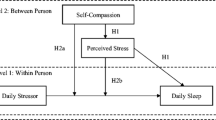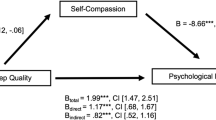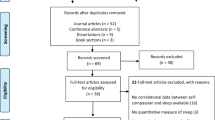Abstract
The study examined the relationship between self-compassion and sleep quality. We also investigated whether the relationship was mediated by brooding, perceived stress, sleep hygiene, and anxiety about sleep and whether self-compassion was associated with anxiety, depression, and mental well-being indirectly through sleep quality. A sample of 468 adults completed measures of demographics, health, sleep quality, self-compassion, predisposing (arousability, brooding, perfectionism, interpersonal problems), precipitating (perceived stress, presence of life-changing events) and perpetuating (sleep hygiene, anxiety about sleep) factors of insomnia, depression, anxiety and mental well-being. The results of the hierarchical multiple regression analysis revealed that low self-compassion was significantly associated with poorer sleep quality when controlling for socio-demographic variables, health-related factors and predisposing factors of insomnia. The association, however, became non-significant when precipitating and perpetuating factors of insomnia were added to the model. Structural equation modelling showed that the relationship between self-compassion and sleep quality was mediated by anxiety about sleep and through sequential mediations involving anxiety about sleep and then sleep hygiene; or anxiety about sleep, perceived stress and then sleep hygiene; or perceived stress and then sleep hygiene. Poor sleep in turn was associated with anxiety and depression, which had a negative effect on mental well-being. This study provided cross-sectional evidence that low self-compassion is a potential risk factor for poor sleep quality, and consequently, poor mental well-being. These findings provide insights into possible mechanisms underlying the relationship between self-compassion and sleep quality that could inform etiological models of insomnia.


Similar content being viewed by others
Data availability
The datasets generated during and/or analysed during the current study are available from the corresponding author on reasonable request.
References
Arimitsu, K., & Hofmann, S. G. (2015). Cognitions as mediators in the relationship between self-compassion and affect. Personality and Individual Differences, 74, 41–48. https://doi.org/10.1016/j.paid.2014.10.008
Azevedo, M. H., Bos, S. C., Soares, M. J., Marques, M., Pereira, A. T., Maia, B., Gomes, A. A., & Macedo, A. (2010). Longitudinal study on perfectionism and sleep disturbance. The World Journal of Biological Psychiatry, 11(2–2), 476–485. https://doi.org/10.3109/15622970903304467
Brown, L., Houston, E. E., Amonoo, H. L., & Bryant, C. (2020). Is self-compassion associated with sleep quality? A Meta-analysis. Mindfulness. https://doi.org/10.1007/s12671-020-01498-0
Butz, S., & Stahlberg, D. (2018). Can self-compassion improve sleep quality via reduced rumination? Self and Identity, 17(6), 666–686. https://doi.org/10.1080/15298868.2018.1456482
Butz, S., & Stahlberg, D. (2020). The relationship between self-compassion and sleep quality: An overview of a seven-year German research program. Behavioral Sciences, 10(3), 64. https://doi.org/10.3390/bs10030064
Buysse, D. J. (2014). Sleep health: Can we define it? Does it matter? Sleep, 37(1), 9–17. https://doi.org/10.5665/sleep.3298
Buysse, D. J., Reynolds, C. F., Monk, T. H., Berman, S. R., & Kupfer, D. J. (1989). The Pittsburgh sleep quality index: A new instrument for psychiatric practice and research. Psychiatry Research, 28(2), 193–213. https://doi.org/10.1016/0165-1781(89)90047-4
Cella, D., Choi, S. W., Condon, D. M., Schalet, B., Hays, R. D., Rothrock, N. E., Yount, S., Cook, K. F., Gershon, R. C., Amtmann, D., DeWalt, D. A., Pilkonis, P. A., Stone, A. A., Weinfurt, K., & Reeve, B. B. (2019). PROMIS adult health profiles: Efficient short-form measures of seven health domains. Value in Health, 22(5), 537–544. https://doi.org/10.1016/j.jval.2019.02.004
Cleeland, C. S. (1989). Measurement of pain by subjective report. Measurement of Pain by Subjective Report, 391–403. Scopus.
Cohen, J. (1988). Statistical power analysis for the behavioral sciences (2nd ed.). L. Erlbaum Associates.
Cohen, S., Kamarck, T., & Mermelstein, R. (1983). A global measure of perceived stress. Journal of Health and Social Behavior, 24(4), 385–396. https://doi.org/10.2307/2136404
Coren, S. (1988). Prediction of insomnia from arousability predisposition scores: Scale development and cross-validation. Behaviour Research and Therapy, 26(5), 415–420. https://doi.org/10.1016/0005-7967(88)90076-9
Egan, S. J., & Shafran, R. (2017). Cognitive-behavioral treatment for perfectionism. In The Psychology of Perfectionism (1st ed.). Routledge.
Gaskin, J. (2016). ‘Specific Indirect Effect’, Gaskination’s Statistics. http://statwiki.gaskination.com/index.php?title=Plugins
Gehrman, P., Findley, J., & Perlis, M. (2012). Insomnia I. The Oxford Handbook of Sleep and Sleep Disorders. https://doi.org/10.1093/oxfordhb/9780195376203.013.0021
Germer, C. K., & Neff, K. D. (2013). Self-compassion in clinical practice. Journal of Clinical Psychology, 69(8), 856–867. https://doi.org/10.1002/jclp.22021
Gong, H., Ni, C.-X., Liu, Y.-Z., Zhang, Y., Su, W.-J., Lian, Y.-J., Peng, W., & Jiang, C.-L. (2016). Mindfulness meditation for insomnia: A meta-analysis of randomized controlled trials. Journal of Psychosomatic Research, 89, 1–6. https://doi.org/10.1016/j.jpsychores.2016.07.016
Gurtman, C. G., McNicol, R., & McGillivray, J. A. (2014). The role of neuroticism in insomnia: Neuroticism in insomnia. Clinical Psychologist, 18(3), 116–124. https://doi.org/10.1111/cp.12029
Hair, J. F. (Ed.). (2014). Multivariate data analysis (7th ed.). Pearson.
Harvey, A. G., & Tang, N. (2012). (Mis)Perception of sleep in insomnia: A puzzle and a resolution. Psychological Bulletin, 138(1), 77–101. https://doi.org/10.1037/a0025730
Harvey, A. G., Tang, N. K. Y., & Browning, L. (2005). Cognitive approaches to insomnia. Clinical Psychology Review, 25(5), 593–611. https://doi.org/10.1016/j.cpr.2005.04.005
Hatcher, L. (2013). Advanced statistics in research: Reading, understanding, and writing up data analysis results. ShadowFinch Media, LLC.
Hauri, P. J. (1991). Sleep hygiene, relaxation therapy, and cognitive interventions. In P. J. Hauri (Ed.), Case Studies in Insomnia (pp. 65–84). Springer US. https://doi.org/10.1007/978-1-4757-9586-8_5
Hofmann, S. G., Asnaani, A., Vonk, I. J. J., Sawyer, A. T., & Fang, A. (2012). The efficacy of cognitive behavioral therapy: A review of meta-analyses. Cognitive Therapy and Research, 36(5), 427–440. https://doi.org/10.1007/s10608-012-9476-1
Holmes, T. H., & Rahe, R. H. (1967). The social readjustment rating scale. Journal of Psychosomatic Research, 11(2), 213–218. https://doi.org/10.1016/0022-3999(67)90010-4
Hu, Y., Wang, Y., Sun, Y., Arteta-Garcia, J., & Purol, S. (2018). Diary study: The protective role of self-compassion on stress-related poor sleep quality. Mindfulness. https://doi.org/10.1007/s12671-018-0939-7
Johnson, E. A., & O’Brien, K. A. (2013). Self-compassion soothes the savage ego-threat system: Effects on negative affect, shame, rumination, and depressive symptoms. Journal of Social and Clinical Psychology, 32(9), 939–963. https://doi.org/10.1521/jscp.2013.32.9.939
Kanen, J., Nazir, R., Sedky, K., & Pradhan, B. (2015). The effects of mindfulness-based interventions on sleep disturbance: A meta-analysis. Adolescent Psychiatry, 5(2), 105–115.
Keith, T. Z. (2015). Multiple regression and beyond: An introduction to multiple regression and structural equation modeling (2nd ed.). Routledge/Taylor & Francis Group. https://doi.org/10.4324/9781315749099
Leary, M. R., Tate, E. B., Adams, C. E., Allen, A. B., & Hancock, J. (2007). Self-compassion and reactions to unpleasant self-relevant events: The implications of treating oneself kindly. Journal of Personality and Social Psychology, 92(5), 887–904.
LeBlanc, M., Mérette, C., Savard, J., Ivers, H., Baillargeon, L., & Morin, C. M. (2009). Incidence and risk factors of insomnia in a population-based sample. Sleep, 32(8), 1027–1037. https://doi.org/10.1093/sleep/32.8.1027
Lundh, L.-G., Broman, J.-E., & Hetta, J. (1995). Personality traits in patients with persistent insomnia. Personality and Individual Differences, 18(3), 393–403. https://doi.org/10.1016/0191-8869(94)00125-C
Mastin, D. F., Bryson, J., & Corwyn, R. (2006). Assessment of sleep hygiene using the Sleep Hygiene Index. Journal of Behavioral Medicine, 29(3), 223–227. https://doi.org/10.1007/s10865-006-9047-6
Matsunaga, M. (2008). Item parceling in structural equation modeling: A primer. Communication Methods and Measures, 2(4), 260–293. https://doi.org/10.1080/19312450802458935
McFarquhar, T., Luyten, P., & Fonagy, P. (2018). Changes in interpersonal problems in the psychotherapeutic treatment of depression as measured by the Inventory of Interpersonal Problems: A systematic review and meta-analysis. Journal of Affective Disorders, 226, 108–123. https://doi.org/10.1016/j.jad.2017.09.036
McIntyre, K. M., Mogle, J. A., Scodes, J. M., Pavlicova, M., Shapiro, P. A., Gorenstein, E. E., Tager, F. A., Monk, C., Almeida, D. M., & Sloan, R. P. (2019). Anger-reduction treatment reduces negative affect reactivity to daily stressors. Journal of Consulting and Clinical Psychology, 87(2), 141–150. https://doi.org/10.1037/ccp0000359
Mosewich, A. D., Crocker, P. R. E., Kowalski, K. C., & DeLongis, A. (2013). Applying self-compassion in sport: An intervention with women athletes. Journal of Sport and Exercise Psychology, 35(5), 514–524. https://doi.org/10.1123/jsep.35.5.514
Moulds, M. L., Kandris, E., Starr, S., & Wong, A. C. M. (2007). The relationship between rumination, avoidance and depression in a non-clinical sample. Behaviour Research and Therapy, 45(2), 251–261. https://doi.org/10.1016/j.brat.2006.03.003
Neff, K. D. (2003). The development and validation of a scale to measure self-compassion. Self and Identity, 2(3), 223–250. https://doi.org/10.1080/15298860309027
Neff, K. D., & Dahm, K. A. (2015). Self-compassion: What it is, what it does, and how it relates to mindfulness. In B. D. Ostafin, M. D. Robinson, & B. P. Meier (Eds.), Handbook of Mindfulness and Self-Regulation (pp. 121–137). Springer.
Neff, K. D., & Germer, C. K. (2013). A pilot study and randomized controlled trial of the mindful self-compassion program: A pilot and randomized trial of MSC program. Journal of Clinical Psychology, 69(1), 28–44. https://doi.org/10.1002/jclp.21923
Ong, C. W., Barney, J. L., Barrett, T. S., Lee, E. B., Levin, M. E., & Twohig, M. P. (2019). The role of psychological inflexibility and self-compassion in acceptance and commitment therapy for clinical perfectionism. Journal of Contextual Behavioral Science, 13, 7–16. https://doi.org/10.1016/j.jcbs.2019.06.005
Ong, J. C., Manber, R., Segal, Z., Xia, Y., Shapiro, S., & Wyatt, J. K. (2014). A randomized controlled trial of mindfulness meditation for chronic insomnia. Sleep, 37(9), 1553–1563. https://doi.org/10.5665/sleep.4010
Perlis, M., Shaw, P. J., Cano, G., & Espie, C. A. (2011). Models of Insomnia. In Principles and Practice of Sleep Medicine: Fifth Edition (pp. 850–865). W.B. Saunders. https://doi.org/10.1016/B978-1-4160-6645-3.00078-5
Ramlee, F., Sanborn, A. N., & Tang, N. K. Y. (2017). What sways people’s judgment of sleep quality? A quantitative choice-making study with good and poor sleepers. Sleep, 40(zsx091). https://doi.org/10.1093/sleep/zsx091
Rice, K. G., Richardson, C. M. E., & Tueller, S. (2014). The short form of the revised almost perfect scale. Journal of Personality Assessment, 96(3), 368–379. https://doi.org/10.1080/00223891.2013.838172
Russell, D. W., Kahn, J. H., Spoth, R., & Altmaier, E. M. (1998). Analyzing data from experimental studies: A latent variable structural equation modeling approach. Journal of Counseling Psychology, 45(1), 18–29. https://doi.org/10.1037/0022-0167.45.1.18
Schumacker, R. E., & Lomax, R. G. (2010). A beginner’s guide to structural equation modeling. Routledge/Taylor & Francis Group.
Singareddy, R., Vgontzas, A. N., Fernandez-Mendoza, J., Liao, D., Calhoun, S., Shaffer, M. L., & Bixler, E. O. (2012). Risk factors for incident chronic insomnia: A general population prospective study. Sleep Medicine, 13(4), 346–353. https://doi.org/10.1016/j.sleep.2011.10.033
Sirois, F. M., Kitner, R., & Hirsch, J. K. (2015). Self-compassion, affect, and health-promoting behaviors. Health Psychology, 34(6), 661–669. https://doi.org/10.1037/hea0000158
Sirois, F. M., Nauts, S., & Molnar, D. S. (2018). Self-compassion and bedtime procrastination: An emotion regulation perspective. Mindfulness. https://doi.org/10.1007/s12671-018-0983-3
Sodano, S. M., & Tracey, T. J. G. (2011). A brief inventory of interpersonal problems-circumplex using nonparametric item response theory: Introducing the IIP-C-IRT. Journal of Personality Assessment, 93(1), 62–75. https://doi.org/10.1080/00223891.2010.528482
Spielman, A. J., Caruso, L. S., & Glovinsky, P. B. (1987). A behavioral perspective on insomnia treatment. The Psychiatric Clinics of North America, 10(4), 541–553.
Stewart-Brown, S., Tennant, A., Tennant, R., Platt, S., Parkinson, J., & Weich, S. (2009). Internal construct validity of the Warwick-Edinburgh Mental Well-being Scale (WEMWBS): A Rasch analysis using data from the Scottish Health Education Population Survey. Health and Quality of Life Outcomes, 7, 15. https://doi.org/10.1186/1477-7525-7-15
Tanaka, H., & Tamura, N. (2016). Sleep education with self-help treatment and sleep health promotion for mental and physical wellness in Japan. Sleep and Biological Rhythms, 14(S1), 89–99. https://doi.org/10.1007/s41105-015-0018-6
Tang, N. K. Y., & Harvey, A. G. (2004). Correcting distorted perception of sleep in insomnia: A novel behavioural experiment? Behaviour Research and Therapy, 42(1), 27–39. https://doi.org/10.1016/S0005-7967(03)00068-8
Treynor, W., Gonzalez, R., & Nolen-Hoeksema, S. (2003). Rumination reconsidered: A psychometric analysis. Cognitive Therapy and Research, 27(3), 247–259. https://doi.org/10.1023/A:1023910315561
van der Zweerde, T., Bisdounis, L., Kyle, S. D., Lancee, J., & van Straten, A. (2019). Cognitive behavioral therapy for insomnia: A meta-analysis of long-term effects in controlled studies. Sleep Medicine Reviews, 48, 101208. https://doi.org/10.1016/j.smrv.2019.08.002
Watkins, E. R., & Roberts, H. (2020). Reflecting on rumination: Consequences, causes, mechanisms and treatment of rumination. Behaviour Research and Therapy, 127, 103573. https://doi.org/10.1016/j.brat.2020.103573
Winbush, N. Y., Gross, C. R., & Kreitzer, M. J. (2007). The effects of mindfulness-based stress reduction on sleep disturbance: A systematic review. Explore, 3(6), 585–591. https://doi.org/10.1016/j.explore.2007.08.003
Yang, C.-M., Lin, S.-C., Hsu, S.-C., & Cheng, C.-P. (2010). Maladaptive sleep hygiene practices in good sleepers and patients with insomnia. Journal of Health Psychology, 15(1), 147–155. https://doi.org/10.1177/1359105309346342
Acknowledgements
We are thankful to our participants and Professor Elizabeth A. Maylor, University of Warwick, the United Kingdom for permission to access her lab’s older adult research panel.
Funding
The study has been supported by Bolashak scholarship, JSC “Center for International Programs”, Kazakhstan.
Author information
Authors and Affiliations
Contributions
Arman Rakhimov, Anu Realo and Nicole K. Y. Tang designed the study protocol. Arman Rakhimov acquired the data. Arman Rakhimov, Anu Realo and Nicole K. Y. Tang conducted the data analysis. Arman Rakhimov and Nicole K. Y. Tang wrote the first draft of the manuscript and all authors contributed to critical review and revision of the manuscript.
Corresponding author
Ethics declarations
Financial interests
The authors declare they have no financial interests.
Non-financial interests
Nicole K. Y. Tang received current and past grant funding as principal investigator or co-investigator from National Institute for Health Research and Medical Research Council, UKRI for other projects related to sleep and/or chronic pain, as well as the use of non-pharmacologic sleep interventions.
Ethics approval
The protocol of the study was approved by the Humanities and Social Sciences Research Ethics Committee, University of Warwick, UK on 29 May 2019. All procedures performed in studies involving human participants were in accordance with the ethical standards of Humanities and Social Sciences Research Ethics Committee, University of Warwick, UK and with the 1964 Helsinki declaration and its later amendments or comparable ethical standards.
Consent to participate
Informed consent was obtained from all individual participants included in the study.
Consent for publication
Not applicable
Additional information
Publisher’s note
Springer Nature remains neutral with regard to jurisdictional claims in published maps and institutional affiliations.
Supplementary Information
Below is the link to the electronic supplementary material.
Rights and permissions
About this article
Cite this article
Rakhimov, A., Ong, J., Realo, A. et al. Being kind to self is being kind to sleep? A structural equation modelling approach evaluating the direct and indirect associations of self-compassion with sleep quality, emotional distress and mental well-being. Curr Psychol 42, 14092–14105 (2023). https://doi.org/10.1007/s12144-021-02661-z
Accepted:
Published:
Issue Date:
DOI: https://doi.org/10.1007/s12144-021-02661-z




